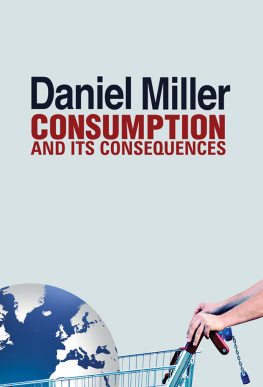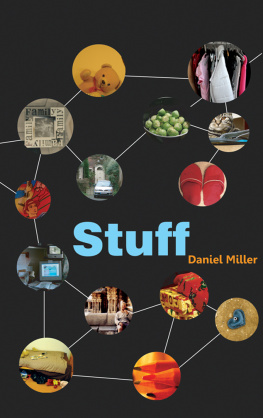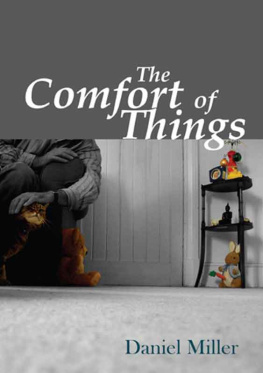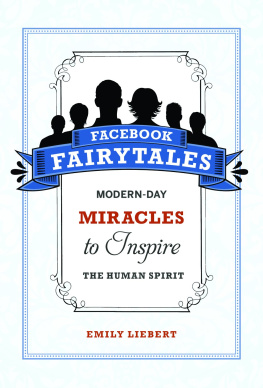Tales from Facebook
By the same author:
Comfort of Things
The very best kind of micro-ethnography. Miller writes better and with more insight and compassion than most novelists.
Kate Fox, author of Watching the English
An outstanding piece of work: a ne example of modern anthropological eldwork, a powerful corrective to the banal notion that materialism is synonymous with excessive individualism and, perhaps above all, an informed, sensitive, and wholly sympathetic guide to the human diversity to be found through the keyholes of our capital city.
Laurie Taylor, Independent
A wonderful and unusual antidote to the fear that humanity and individuality is losing its battle with modern consumerism. In his book, even the most trivial product of consumerism can be rendered almost magical by its owners.
Financial Times
Daniel Millers moving account, The Comfort of Things, is a stout defence of that pejorative notion: only sentimental value. He builds up a tapestry of the variety of ways in which people use things to express themselves and make meaning in their lives. The nondescript, the ordinary, can be invested with great value. In Millers account, people knit rich associations with objects, caring for each, using them to express relationships.
Guardian
Stuff
[Stuff] really is a little gem. Timely, well-written and highly accessible, it is a concise and grounded resource in the struggle to analyse the complexities of contemporary cultural life... For undergraduates and general critical readers alike, it will be a welcome and thought-provoking reminder that the material world of things we have created, and which in turn helps to create us, needs to be understood dialectically for better and for worse.
Times Higher Education
[T]here are fascinating things here: a seven-page description of how a woman who wears a sari navigates daily life through the garment; a portrait of council tenants as artists redecorating their ats in different ways; and analyses of fashion, furnishing and mobile phone relationships in Jamaica. When Miller is focused on the details, the writing hums with empathetic colour and detail.
Guardian
Au Pair (with Zuzana Burikova)
Au Pair is a ripping good read, full of salacious details of the indignities of trying to live and work as a foreigner in middle-class London households.
Times Higher Education
With its ne-grained ethnographic detail, skilfully presented in vivid prose, this book illuminates every aspect of the hopes, fantasies and frustrations that constitute the frequently troubled ties and misunderstandings between au pairs and their employers. A huge pleasure to read, Au Pair provides a denitive, indispensable text for addressing this increasingly prevalent facet of family life, with its own suggestions for improving the lives of both au pairs and the families in which they reside.
Lynne Segal, author of Why Feminism?
The Theory of Shopping
Miller begins with an excellent and sensitive ethnography of shopping rmly rooted among his own native north Londoners. It is a ne example of what an anthropologist can achieve at home.
Times Higher Education
His demystication of what appears to be, on the surface, straightforward juggling of cost, quantity and quality is absorbing reading.
Will Self, New Statesman and Society
Tales from Facebook
Daniel Miller
polity
Copyright Daniel Miller 2011
The right of Daniel Miller to be identied as Author of this Work has been asserted in accordance with the UK Copyright, Designs and Patents Act 1988.
First published in 2011 by Polity Press
Polity Press
65 Bridge Street
Cambridge CB2 1UR, UK
Polity Press
350 Main Street
Malden, MA 02148, USA
All rights reserved. Except for the quotation of short passages for the purpose of criticism and review, no part of this publication may be reproduced, stored in a retrieval system, or transmitted, in any form or by any means, electronic, mechanical, photocopying, recording or otherwise, without the prior permission of the publisher.
ISBN-13: 978-0-7456-3787-7
A catalogue record for this book is available from the British Library.
Typeset in 11 on 13 pt Sabon
by Servis Filmsetting Ltd, Stockport, Cheshire
Printed by Sheridan Books, Inc. Chelsea, MI USA
The publisher has used its best endeavours to ensure that the URLs for external websites referred to in this book are correct and active at the time of going to press. However, the publisher has no responsibility for the websites and can make no guarantee that a site will remain live or that the content is or will remain appropriate.
Every effort has been made to trace all copyright holders, but if any have been inadvertently overlooked the publisher will be pleased to include any necessary credits in any subsequent reprint or edition.
For further information on Polity, visit our website: www.politybooks.com
Preface
Facebook, now in the sixth year of existence, has overtaken Google to become the most visited site on the internet. According to the companys statistics, there are currently over 500 million active users, of whom half log on during any given day. Every month sees three billion photos posted and every day sees 60 million status updates. The average user has 130 friends and spends just under an hour a day on the site. These are about the last gures you will encounter in reading this book. While we can all sit amazed by such statistics, this volume looks to the other end of the spectrum the particular individuals, their friends and their families who use the site. It is an anthropological enquiry into the consequences of social networking for ordinary people. How have their lives been changed by the experience of using Facebook? What impact does it have on the relationships they really care about? Does Facebook approximate some kind of community? How does it change the way we see ourselves? Why are people seemingly so unconcerned with this loss of privacy?
One problem is the tendency to assume the origins of the site will necessarily dictate its future. We know that Facebook was invented for use by students in colleges. Yet that fact barely impinges upon the contents of this book. 2010 was the year in which we could start to see why Facebook might eventually have more importance for an elderly person who is housebound, and has no other means of effective socialization, than for a student. So the focus will be on what Facebook seems to be becoming rather than what it initially has been. Because Facebook started in the US, most of the research on its impact has been within the US. But today it is a global site where over 70 per cent of its users live outside the US and research needs to encompass this increasing diversity.
There are good reasons to view Facebook through an anthropological lens. After all, one denition of anthropology might be that while other academic disciplines treat people as individuals, anthropology has always treated people as part of a wider set of relationships. Indeed, prior to the invention of the internet, it was the way the individual was understood in anthropology that might have been termed a social networking site. So a new facility actually called a social networking site ought to be of particular interest to an anthropologist. On 21 April 2010, Mike Zuckerberg, the founder of Facebook, announced at the F8 conference a new phase in the development of the site. The words he used were we are building toward a web where the default is social. Given that for a century we have imagined that participation in community and social relations was in decline, this reversal of previous trends seems both astonishing and particularly relevant to the premise and future of anthropology.
Next page















